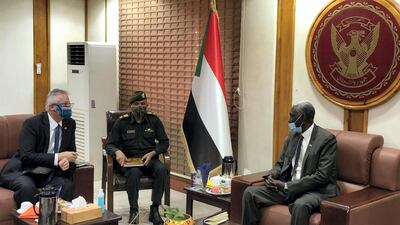A senior military delegation from the US Africa Command concluded a two-day visit to Sudan on Wednesday.
Officials discussed deepening naval, counterterrorism and defence co-operation between Washington and Khartoum.
The visit, the first for a senior US delegation since Sudan was removed from the list of state sponsors of terrorism last month, was led by Andrew Young, deputy to the US Africa Command commander for Civil-Military Engagement, and Africom Director for Intelligence and Navy Rear Admiral Heidi Berg.
The two US military officials met the chairman of Sudan’s Sovereign Council Gen Abdel Fattah Al Burhan, Prime Minister Abdalla Hamdok, Chief of Defence Gen Mohamed Osman Al Hussein and Minister of Defence Maj Gen Yassin Ibrahim Yassin. The delegation also visited the Sudanese Higher Military Academy.
“We are at a moment of historic change in the bilateral relationship between the United States and Sudan, made possible by the brave efforts of the Sudanese people to chart a bold new course towards democracy,” Mr Young said.
Future military-to-military engagements between the two forces were also on the agenda.
"We are exploring possibilities and opportunities with Sudan, militarily and diplomatically. We see increased engagement in the months and years ahead,” Mr Young added.
A visit by Gen Al Burhan to Stuttgart, and the establishment of a US naval presence on the Red Sea in Sudan are among the ideas being considered, Cameron Hudson, a senior fellow at the Atlantic Council and former chief of staff for the US special envoy to Sudan, told The National.
In December, Sudan signed a naval port agreement with Russia. Mr Hudson argued that the "US should be both embarrassed and anxious to establish its own strategic linkages to Sudan," following Russia's naval expansion.
Admiral Berg said increasing maritime co-operation and training was also discussed during the visit. She said issues such as combating terrorism, piracy and malign activities, and ensuring safe seas for shipping represented a shared interest.
"The conversations we've had here this week strengthened the foundation for cooperatively addressing these challenges to peace and stability for years to come." The discussions also involved opportunities for training of Sudanese forces as the country transitions after the removal of Omar Al Bashir from power.
Following Mr Al Bashir's downfall in April 2019, the Trump administration took major strides in normalising relations, leading to granting Khartoum partial immunity from further lawsuits after a payout of $335 million for US victims of Al Qaeda attacks that the Al Bashir regime supported. Sudan also normalised relations with Israel last year, adding impetus to its improved bilateral ties with Washington.
The new Biden administration has signalled its intent to continue this approach and helping Sudan through this transition. Biden officials such as Secretary of State Antony Blinken and National Security Adviser Jake Sullivan have pledged to build on improving relations following the Abraham Accord.
US ties with Sudan were mentioned in a call between Mr Sullivan and Israeli National Security Adviser Meir Ben Shabbat of Israel last week.
“They discussed opportunities to enhance the partnership over the coming months, including by building on the success of Israel’s normalisation arrangements with UAE, Bahrain, Sudan and Morocco,” the White House said.


